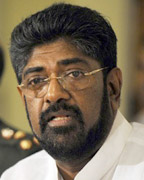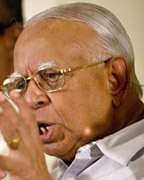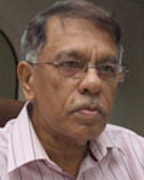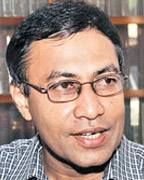EP resolution not binding on Government - Minister Keheliya
Rambukwella
By Manjula Fernando
The Eastern Provincial Council last week passed a resolution calling
for the implementation in full of the 13th Amendment to the
Constitution. The resolution moved by the SLMC received support from
ITAK and UNP councillors and was passed with a simple majority.
 |
| Minister
Keheliya Rambukwella |
 |
| R.Sampanthan |
 |
| Minister,
Weerakumara Dissanyake |
 |
| Hasan Ali |
 |
| A. Sarveswaran |
The Jathika Hela Urumaya (JHU) and the National Freedom Front (NFF)
joined by other forces on Thursday warned that this signified a
dangerous alliance between the TNA and the SLMC. They alleged the SLMC
and TNA may call for the merger of the two provinces next and then a
resolution demanding self rule or a similar set up.
The Eastern Provincial Council is governed by the UPFA with a
majority 14 seats, while ITAK with 11 seats is the second force followed
by SLMC's seven, UNP four and NFF one seat.
The Sunday Observer contacted different stake holders to obtain their
comments on the recent development.
Excerpts of the interviews are carried below
Media and Information Minister, Keheliya Rambukwella: Implementation
of the 13th Amendment is under discussion. It is discussed and debated
even today. These amendments are not stone inscriptions which can't be
changed. What happened in the Eastern Province is that the SLMC has
brought a resolution and some other political parties have supported it.
The SLMC is a constituent party of the UPFA. The crux of the matter is
that there are so many constituent parties within the UPFA that hold
different political opinions. We have allowed space for them to air
their views but when a final decision is taken the majority view will be
accepted.
Some parties within the UPFA say the 13-A should be implemented in
full, while others object. At the moment there is serious discussion
about it. Dissenting views have been expressed all around and even
within Parliament this is the case.
We want to accommodate all views and come to a common agreement.
Hence a Parliamentary Select Committee has been appointed but some
parties have disassociated themselves from this process, it is their
decision and that is a part of democracy.
As for the Eastern Province resolution that was passed last month, it
has no binding effect on the Government. Even if a PC resolution is
passed with a majority, it will not become law. Resolutions do not
override existing law. It is a matter of the Constitution. There are so
many tools used within a democratic system.
The National Freedom Front, the Jathika Hela Urumaya and others have
expressed that this move by EP councillors could endanger the country.
It's a point of view, it should be respected and the TNA and SLMC views
too will be accommodated when a final decision is arrived at on the 13th
Amendment.
As a Government we are opposed to any kind of separation. Even the
Constitution does not provide for a separation. What we are looking for
is a means to devolve power without creating any room for separatist
elements to claim victory.
TNA Parliamentary Group Leader, R.Sampanthan: The 13th Amendment is
part of the Constitution and the Constitution has a binding effect on
everyone, be it the Government or the Provincial Councils, everyone is
bound by the 13th Amendment. To make the devolution of power meaningful,
full implementation of the 13th Amendment is expected. President Mahinda
Rajapaksa and the Government has taken more than one commitment in this
regard.
The Eastern Provincial Council merely confirmed that this provision
in the Constitution must be fully implemented, it is a perfectly legal
resolution. There is nothing wrong in that.
NFF parliamentarian and Traditional Industries Deputy Minister,
Weerakumara Dissanyake: The TNA and UNP has always been an unholy union
with regard to the 13th Amendment. Now the SLMC has joined them. The
SLMC is digging its own
grave if they support this piece of crooked legislature which does
not have the blessings of the people of this country. They will be
jumping from the frying pan to the fire.
The map of Eelam had no space for Muslims. They were chased off from
the North by the LTTE and Trincomalee was to be the capital of the LTTE
kingdom and the TNA supported it and still support this ideology. Their
claimed territory included the Anuradhapura district as well as
Kalpitiya and Puttalam in addition to the Northern and Eastern
provinces.
Muslim leaders must realise that their people have a rightful place
under the present Government before they try to rock the boat. The
present leaders of the SLMC is ignorant to this reality.
The Eastern Provincial Council must give priority to attend to the
immediate needs of their people such as issues concerning education,
livelihood, agriculture, fisheries and electricity. If something is
getting in their way in carrying out their functions then they have a
legitimate grievance which should be referred to the President as the
Head of State. They must bring it to the notice of the President and ask
for concessions and more powers. When it is not so, resorting to
political decisions should be condemned. When there are other issues at
hand where people need urgent redress, they have resorted to fulfill
political aspirations. This is not expected of public representatives.
On the other hand, the UNP provincial councilors must pass a
resolution at Sirikotha to resolve the leadership crisis within the UNP
before helping the TNA or SLMC to call for the full implementation of
the 13th Amendment. Once the UNP leader offered Eelam to Prabhakaran on
a plate therefore the UNP Eastern provincial councillors supporting
separatist elements is not surprising. The NFF is against the
implementation of the 13th Amendment since it clears the path for
separatism.
SLMC General Secretary and MP, Hasan Ali : This resolution was handed
over three months before. It is not a new one. It was accommodated in
the agenda and taken for debate at the end of last month. The call is
for a power sharing arrangement to the peripheries. The SLMC is not
accommodated in the Parliamentary Select Committee also. Therefore,
somehow we had to express our views on the 13th Amendment. That is the
reason why this resolution was moved by the SLMC in the Eastern
Province.
Our policy on the matter had to be made known. We are different from
other constituent partners in the UPFA. The parties who contested with
the UPFA in elections must be having a different understanding with the
Government. But according to our understanding with the Government, we
can always take decisions independently.
There are some extreme comments expressed on the SLMC having the same
sentiments with regard to the TNA on 13th Amendment. The Sri Lanka
Muslim Congress will never support the division of this country. Never
ever, that is not in our agenda at all.
These are baseless allegations. The resolution was supported by the
Sinhala councillors of the UNP as well.
The problem is some extreme elements in the majority community thrive
on keeping communal sentiments alive. We are also citizens of this
country.
Our country is not Saudi Arabia. Sri Lanka is our country. I am proud
to say that this is my country. Our aspirations should be accommodated
and the reconciliation process must not be politicised.
Senior Lecturer at the Faulty of Law, Colombo University A.
Sarveswaran: The 13-A cannot be seen in isolation from the Constitution.
It is a part of the Constitution. The resolution is asking for the full
implementation of the 13th Amendment. That is the basic requirement for
passing this resolution. The resolution is not illegal in that sense.
When it comes to the fear of the people, on the 13-A, I would like to
add that following the Supreme Court judgment on land powers, I don't
think people have any reason to fear because by the SC ruling ,the
powers in the 13-A on provincial lands has been further diluted. |

